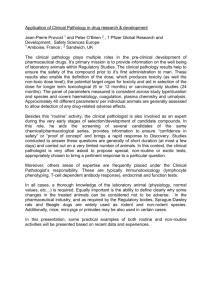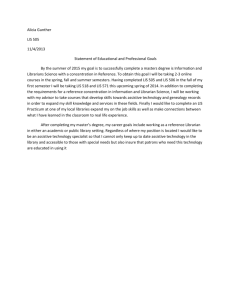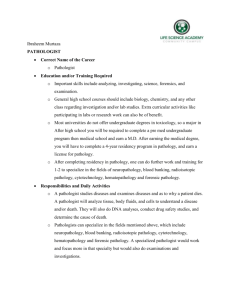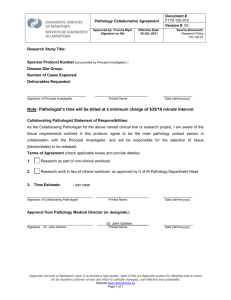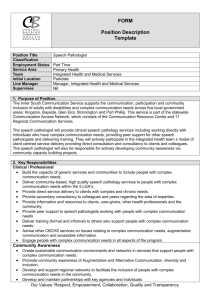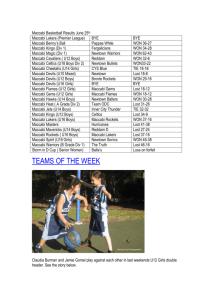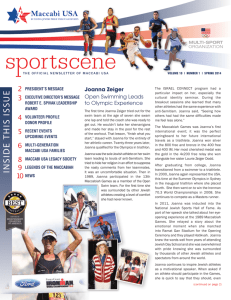This document describes Maccabi Health Care Services` intention
advertisement
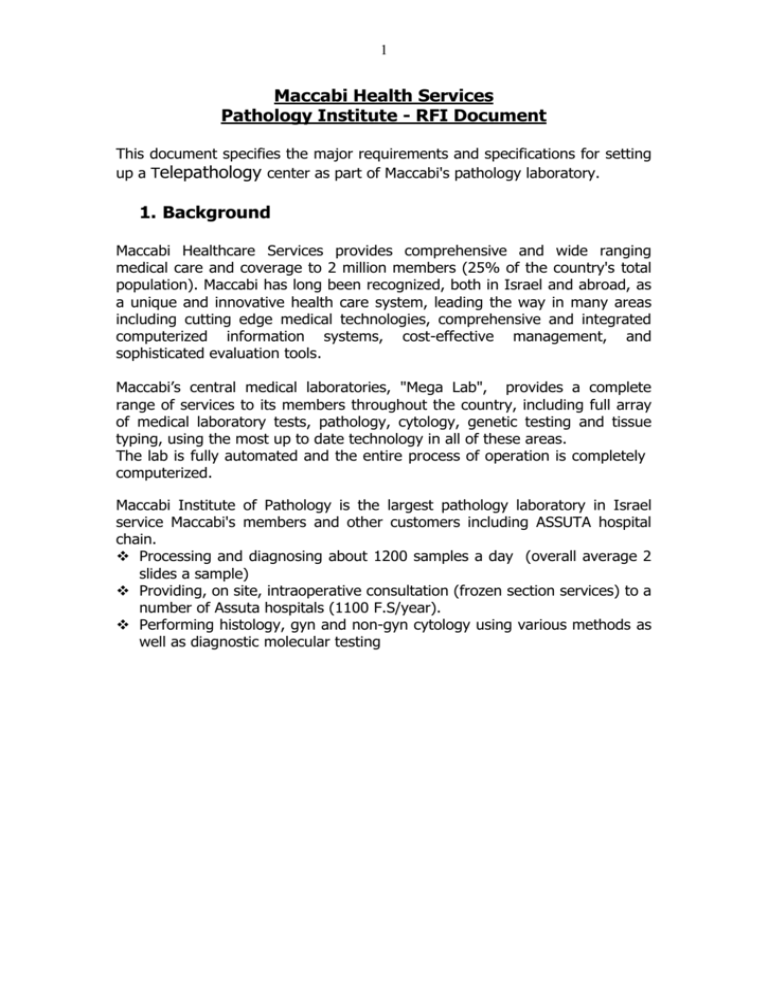
1 Maccabi Health Services Pathology Institute - RFI Document This document specifies the major requirements and specifications for setting up a Telepathology center as part of Maccabi's pathology laboratory. 1. Background Maccabi Healthcare Services provides comprehensive and wide ranging medical care and coverage to 2 million members (25% of the country's total population). Maccabi has long been recognized, both in Israel and abroad, as a unique and innovative health care system, leading the way in many areas including cutting edge medical technologies, comprehensive and integrated computerized information systems, cost-effective management, and sophisticated evaluation tools. Maccabi’s central medical laboratories, "Mega Lab", provides a complete range of services to its members throughout the country, including full array of medical laboratory tests, pathology, cytology, genetic testing and tissue typing, using the most up to date technology in all of these areas. The lab is fully automated and the entire process of operation is completely computerized. Maccabi Institute of Pathology is the largest pathology laboratory in Israel service Maccabi's members and other customers including ASSUTA hospital chain. Processing and diagnosing about 1200 samples a day (overall average 2 slides a sample) Providing, on site, intraoperative consultation (frozen section services) to a number of Assuta hospitals (1100 F.S/year). Performing histology, gyn and non-gyn cytology using various methods as well as diagnostic molecular testing 2 2. Goals Provide the lab and pathologist the ability to rapidly review slides anywhere anytime using unified application and tools. Improve and optimize the laboratory and pathologist workflow. Lab application joined with digital slides enables to improve the efficiency and quality of various steps involved in pathology workflow. Advance the lab and the pathologists to the next generation tools. Tools which, among others, will; ◊ Maximize pathologists' time and reduce time and expenses of covering remote facilities. ◊ Reduce errors and improve accuracy. ◊ Quickly and easily access previous cases and slides for comparison. ◊ Effortlessly share slides with colleagues and gain rapid access to subspecialty expertise. ◊ Decrease costs associated with handling, managing and shipping glass slides. ◊ Supports analysis of information generated from the digitized slide, including the built-in image analysis protocols for analyzing immunohistochemistry (eg. Breast panel) and others to be developed. ◊ Grow outreach business. 3 3. Work flows A. Frozen service A daily operation work list, for each location, is provided ahead of time to the lab administration. Based on these lists a case will be created in the lab LIS system. The pathologist(s) on frozen section service will spend the day (or night) in the local pathology lab "waiting" for a sample. Special trained technicians will be on site at the hospital to receive/access samples, perform gross dissection and slide preparation under the direction of the "remote" pathologist using macro camera/video. Scanned slides will be diagnosed by the "remote" pathologist and reported back to the surgeon at the hospital. B. Diagnosis work flow Slide preparation process will continue the same way. Once the slide is ready for review it will be scanned and archived. Since the slide is barcoded, its Meta data will be stored along with the slide image in a DB. The lab LIS system will be indicated that the slide image is ready and will be updated with the slide Meta data. The pathologist, following work list prepared and managed in the LIS system, will select a case to diagnose and will be able to review the case history, the clinical details (in the LIS) and the slide images at the same time and write the diagnosis directly in the LIS. The interface between the LIS and the "slide image system" will be LIS driven so the pathologist or any lab staff member will be able to access any case's slides images from the LIS. 4 4. Requirements A. System Maccabi is looking for a comprehensive solution to establish a telepathology center where; ◊ Immediate intermediary solution can be implemented to answer the frozen section service workflow. ◊ The "slide image system" fully integrates with the LIS system and will be bidirectional. ◊ Barcodes (one and two dimensions) can be used and all data entry is completely automated. ◊ Rapid response times (scanning, retrieving images etc.) will sustain the lab's work flows and processes. ◊ The work environment will be LIS driven. ◊ Desk Top Integration (DTI) between the LIS and the"slide image system" ◊ Maximized image compression ability without damaging image quality and with in regulation. ◊ The system will be web based. ◊ Intuitive user interface and operation. ◊ The system and the archive can handle images and video produced by macro camera / video. ◊ Will include short and long term archive to maintain permanent slide records that may be needed for future use. ◊ Meet international compliance standards with security and data auditing system wide. ◊ Slides images will comply with DICOM / jpeg2000 standard ◊ Support Hebrew metadata B. Components I. a. b. c. d. Hardware & infrastructure Macro camera/video to be used in hospital locations to support “frozen section” service. Scanners - 3-5 low capacity, with fast scanning time, easy to use, to be placed in hospital locations. - Number of high volume rapid scanners to be used in the central lab. Servers - Recommended architecture - Minimum machine requirements Communication lines 5 - Minimum requirement for local and wide network e. Storage - Preferred technology f. Dedicated screens (if needed) II. Software g. Viewers - Available capabilities - Image load technology - Tools on hand h. Archive system - Archiving methods - Ability to “work’ with foreign images (images that were created with other brand scanners or systems) i. Interface with LIS - API protocol 5. Summary This document describes Maccabi Health Care Services’ intention, to select and implement a "Digital pathology" / "Tele-pathology" system as part of the effort to establish a Tele-pathology center in Maccabi Institute of Pathology as described. Proposals are welcome, as part of the RFI process. The purpose of this RFI is for information gathering only. Maccabi has no obligation to select a vendor and /or negotiate and/or contract with any of the responders. Maccabi reserve the right to publish anther RFI and/or a RFP and/or tender and/or to end the process with no action. All documentation should be received by Aug. 28, 2011 to these email address: Lavi_mirya@mac.org.il Eliassi_e@mac.org.il Contact person: Miri Lavi IS manager Maccabi Central Laboratory 9 Hamada st. – Park Tamar Rehovot 76703 – ISRAEL Phone No. – 972-8-9311563 Cellular – 972-50-8230035 Email: lavi_mirya@mac.org.il

